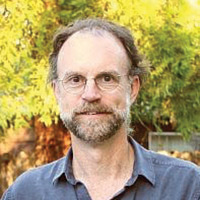17 Mar 2014
2014 sees a change at SCI's Journal of the Science of Food and Agriculture. Here, Dr Mark Shepherd (top picture) and Prof Andrew Waterhouse describe their vision for the journal as they become the new joint Editors-in-Chief.
What does your current job involve?
AW: Professor of enology at University of California, Davis, since 1991. I'm responsible for teaching our wine analysis course as well as a graduate level course on natural products of wine. I'm also responsible for running a research lab that typically has 2-6 graduate students and undergraduates, 1-2 postdoctoral research assistants, a visitor or two from overseas (currently China and Italy) and one professional research associate. I also have university service duties, such as reviewing academic programmes.
MS: Senior Scientist in the Land and Environment Group within AgResearch, New Zealand's largest Crown Research Institute, focusing on pastoral research. I lead or participate in a wide range of research programmes where the emphasis is on developing sustainable pastoral production systems (profitable and with low environmental footprint). My research area is nitrogen cycling.
How did you decide you wanted a career in science?

MS: Frankly, serendipity! There wasn't much career guidance at school. I liked science, I liked growing plants, and agricultural chemistry seemed to combine both of these interests when I was combing through the huge list of available university courses. I often reflect on how that single decision has enabled me to follow an interesting and rewarding career path.
What have been the major milestones in your career?
AW: Gaining the UC Davis position in 1991 was the most important. Others include a decision in 2000 to study oxidation chemistry with a chemist in New Zealand, Paul Kilmartin. That interest in wine oxidation continues today.
MS: My research on nitrate leaching from arable agriculture in the UK in the 1990s, understanding practices that can decrease nitrogen loss: work that has contributed to environmental policy development. Moving to New Zealand to apply my skill set to pastoral agriculture in a country where the nation's wealth depends heavily on sustainable agricultural production. More recently, being a joint winner of AgResearch's inaugural Technology Prize for my involvement in developing the nutrient management model 'Overseer'.
If you hadn't pursued a career in science, what would you be doing now?
AW: I might be a photographer as that has been an interest since high school. Professionally, I probably would have gone into some sort of engineering.
MS: Professional footballer or cricketer? I did also (briefly) consider a career in the police after university. In the unlikely event of any of these having come to fruition, I would now be retired and looking for a second career, possibly in agricultural science!
What have you enjoyed most about your involvement with JSFA?
AW: The editors and staff are all dedicated and committed to the excellence of the journal.
MS: Learning about the process of peer review and publishing of scientific papers - much more complicated than I thought when I was simply a scientist submitting papers. This includes the process of managing manuscripts; interacting with authors and reviewers; and dealing with publishing ethics.
How has the practice of journal publishing changed in that time?
AW: As David Reid, departing EiC has pointed out, we now have to think of publishing as an online exercise with paper copies being secondary. I agree completely and our strategies need to consider how best to publish electronically.
MS: The number of papers we receive has increased dramatically, and the demographic of our submitters is also changing, with a large proportion of papers now from China and Asia as a whole. The evolution of web-based manuscript management is much more efficient in terms of handling the submission and the review process. An additional benefit of this is that these systems allow us to collect key metrics on how we perform as a journal (eg average days in review) and how the papers we publish perform (number of page views, number of downloads). All of this can only be good in improving the quality of the papers we publish and the service we offer to authors.
What do you see as being the biggest challenge of becoming Editor-in-Chief?
AW: Keeping the journal current with technology and indirectly with policy innovations in agriculture and food production.
MS: Helping the journal grow, by which I mean that it is seen by scientists as one of the most important journals to publish their key work.
How do you envisage the future of the subject, and the journal?
AW: One of the major grand challenges of this century will be to continue feeding our population in a sustainable manner. This will require much innovation both in agriculture and food, and, as Mark notes, we want JSFA to be the published source for the major innovations.
MS: Both extremely rosy. Sustainable food production is the topic. JSFA is a broad-based journal reporting science relating to agricultural production through to food quality and health. We are well placed to report important scientific development as the planet strives to feed increasingly more people with improved diets in a sustainable manner.
